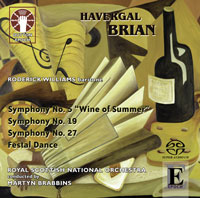|
|
|
FWIW, this is the kind of review I find helpful.
I bought some CDs of Brian's music years ago on the recommendation of various professional reviewers, but I found it to be exactly as krisjan describes.
|
|
|
Post by krisjan May 31, 2015 (2 of 11)
|
|
Thanks Simon - it's good to know that people find it useful!
|
|
|
Post by krisjan May 31, 2015 (3 of 11)
|
|
BTW - I nearly started the review with "Well, someone's gotta do it so I guess it may as well be me" but then thought better of it since the lead line is what people will see before clicking on the entire review. It was an odd review to write because the performance and recording both seem OK to me - its just the MUSIC that sucks IMO. So, 1/2 star for the music...
|
|
|
Post by steviev May 31, 2015 (4 of 11)
|
|
Yes, you did a great job describing Brian's music -- he's one of those composers you must listen to moment-by-moment because his structures are somewhere between elusive to nonexistent. This is the best orchestral recording I've heard from Dutton.
|
|
|
|
|
|
steviev said:
Yes, you did a great job describing Brian's music -- he's one of those composers you must listen to moment-by-moment because his structures are somewhere between elusive to nonexistent.
Isn't that (i.e. not having control of form over large spans) sort of the definition of a bad composer?
By the way, I always find Dutton's covers very appealing, but I'm seldom drawn to the repertoire (second- and third-tier British composers).
|
|
|
Post by Claude June 1, 2015 (6 of 11)
|
|
|
|
|
|
|
|
|
Claude said:
There's an interesting description of music on Wikipedia:
http://en.wikipedia.org/wiki/Havergal_Brian
Thanks for that. Though it's (fairly) sympathetic, the description doesn't alter my opinion. Brian may 'maintain strong symphonic cohesion by long-term tonal processes similar to Carl Nielsen's "progressive tonality",' but if I can't discern them (as I can in Nielsen's works) it makes no odds.
|
|
|
|
|
|
Dutton's core market thrives on this sort of thing but their venture into our SACD world needs a little more foresight. In the same way that some people think that anything daubed onto canvas is art so there exists a group of musicologists who will argue that poorly composed tosh of this sort Is music.
Damn! the bees are a swarmin'
|
|
|
Post by steviev June 1, 2015 (9 of 11)
|
|
Simon V. said:
Thanks for that. Though it's (fairly) sympathetic, the description doesn't alter my opinion. Brian may 'maintain strong symphonic cohesion by long-term tonal processes similar to Carl Nielsen's "progressive tonality",' but if I can't discern them (as I can in Nielsen's works) it makes no odds.
When I can't hear the structure of a piece, even when it's carefully explained along with music examples in detailed liner notes, I just listen as if it's a stream-of-consciousness ramble; this way I at least enjoy the passing thematic fragments, harmonies, tone colors, textures.
For me this started with Kokkonen's symphonies on BIS, all of which use tone rows I think, and to my ears a tone row is a tone row is a tone row, and I simply could not discern the structures as described in the notes, so I decided to forget about structure and just enjoy each moment in isolation, unconnected to whatever came before or after. It's my default listening method for just about everything written since World War I, including Brian.
|
|
|
Post by Simon V. June 1, 2015 (10 of 11)
|
|
steviev said:
When I can't hear the structure of a piece, even when it's carefully explained along with music examples in detailed liner notes, I just listen as if it's a stream-of-consciousness ramble; this way I at least enjoy the passing thematic fragments, harmonies, tone colors, textures.
For me this started with Kokkonen's symphonies on BIS, all of which use tone rows I think, and to my ears a tone row is a tone row is a tone row, and I simply could not discern the structures as described in the notes, so I decided to forget about structure and just enjoy each moment in isolation, unconnected to whatever came before or after. It's my default listening method for just about everything written since World War I, including Brian.
For me, while that may be a sonic experience, it's not a musical one. Music, whose structure unfolds over time, depends for its effects on our capacity for both recollection and anticipation, and in the absence of discernible form these become impossible.
It's funny: I think of the mid-twentieth century as a great period for tonal composition. The symphonies of, say, Roussel, Honegger, Prokofiev or Martinu are wonderful works, whether or not they fit into Adorno's dialectical scheme of musical progress, which we all still seem tacitly to subscribe to.
|
|

